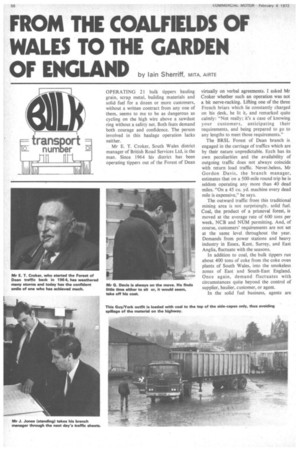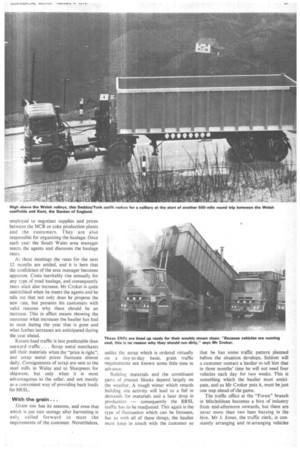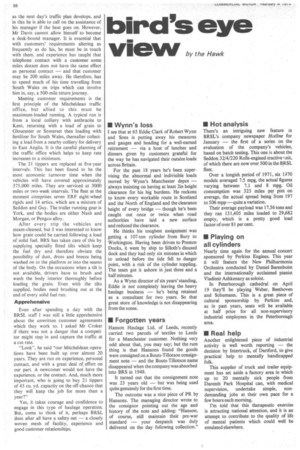FROM THE COALFIELDS OF WALES TO THE GARDEN
Page 60

Page 61

Page 62

If you've noticed an error in this article please click here to report it so we can fix it.
OF ENGLAND by lain Sherriff, MITA, AIRTE
OPERATING 21 bulk tippers hauling grain, scrap metal, building materials and solid fuel for a dozen or more customers, without a written contract from any one of them, seems to me to be as dangerous as cycling on the high wire above a sawdust ring without a safety net. Both feats demand both courage and confidence. The person involved in this haulage operation lacks neither.
Mr E. T. Croker, South Wales district manager of British Road Services Ltd, is the man. Since 1964 his district has been operating tippers out of the Forest of Dean virtually on verbal agreements. I asked Mr Croker whether such an operation was not a bit nerve-racking. Lifting one of the three French briars which lie constantly charged on his desk, he lit it, and remarked quite calmly: "Not really; it's a case of knowing your customers, anticipating their requirements, and being prepared to go to any lengths to meet those requirements."
The BRSL Forest of Dean branch is engaged in the carriage of traffics which are by their nature unpredictable. Each has its own peculiarities and the availability of outgoing traffic does not always coincide with return load traffic. Never,heless, Mr Gordon Davis, the branch manager, estimates that on a 500-mile round trip he is seldom operating any more than 40 dead miles. "On a 45 cu. yd. machine every dead mile is expensive," he says.
The outward traffic from this traditional mining area is not surprisingly, solid fuel. Coal, the product of a primeval forest, is moved at the average rate of 600 tons per week, NCB and NUM permitting. And, of course, customers' requirements are not set at the same level throughout the year. Demands from power stations and heavy industry in Essex, Kent, Surrey, and East Anglia, fluctuate with the seasons.
In addition to coal, the bulk tippers run about 400 tons of coke from the coke oven plants of South Wales, into the smokeless zones of East and South-East England. Once again, demand fluctuates with circumstances quite beyond the control of supplier, haulier, customer, or agent.
In the solid fuel business, agents are employed to negotiate supplies and prices between the NCB or coke production plants and the customers. They are also responsible for organizing the haulage. Once each year the South Wales area manager meets the agents and discusses the haulage rates.
At these meetings the rates for the next 12 months are settled, and it is here that the confidence of the area manager becomes apparent. Costs inevitably rise annually for any type of road haulage, and consequently rates Must also increase. Mr Croker is quite uninhibited when he meets the agents and he tells me that not only does he propose the new rate, but presents his customers with valid reasons why there should be an increase. This in effect means showing the customer what increases the haulier has had to meet during the year that is gone and what further increases are anticipated during the year ahead.
Return-load traffic is less predictable than outward traffic . . . Scrap metal merchants sell their materials when the "price is right", and scrap metal prices fluctuate almost daily. Consignments of scrap are sent to the steel mills in Wales and to Sharpness for shipment, but only when it is most advantageous to the seller, and not merely as a convenient way of providing back loads for BRSL.
With the grain ...
Grain too has its seasons, and even that which is put into storage after harvesting is only called forward to meet the requirements of the customer. Nevertheless, unlike the scrap which is ordered virtually on a day-to-day basis, grain traffic requirements are known some little time in advance.
Building materials and the constituent parts of precast blocks depend largely on the weather. A rough winter which retards building site activity will lead to a fall in demands for materials and a later drop in production — consequently the BRSL traffic has to be readjusted. This again is the type of fluctuation which can be foreseen, but as with all of these things, the haulier must keep in touch with the customer so
that he has some traffic pattern planned before the situation develops. Seldom will a customer contact a haulier to tell him that in three months' time he will not need four vehicles each day for two weeks. This is something which the haulier must anticipate, and as Mr Croker puts it, must be just one step ahead of the game.
The traffic office at the "Forest" branch in Mitcheldean becomes a hive of industry from mid-afternoon onwards, but there are never more than two bees buzzing in the hive. Mr J. Jones, the traffic clerk, is constantly arranging and re-arranging vehicles as the next day's traffic plan develops, and in this he is able to call on the assistance of his manager if the heat goes on. However, Mr Davis cannot allow himself to become a desk-bound manager. It is essential that with customers' requirements altering as frequently as do his, he must be in touch with them, and experience has taught that telephone contact with a customer some miles distant does not have the same effect as personal contact — and that customer may be 200 miles away. He therefore, has to spend much of his time travelling from South Wales on trips which can involve him in, say, a 500-mile return journey.
Meeting customer requirements is the first principle of the Mitcheldean traffic office, but allied to this must be maximum-loaded running. A typical run is from a local colliery with anthracite to Kent, returning with a load of grain to Gloucester or Somerset then loading with fertilizer for South Wales, thereafter collecting a load from a nearby colliery for delivery to East Anglia. It is the careful planning of the traffic office which helps to keep rate increases to a minimum.
The 21 tippers are replaced at five-year intervals. This has been found to be the most economic turnover time when the vehicles will have covered approximately 375,000 miles. They are serviced at 3000 miles or two-week intervals. The fleet at the moment comprises seven ERF eight-wheel rigids and 14 artics. which are a mixture of Seddon and Guy. The trailer running gear is York, and the bodies are either Nash and Morgan, or Pengco alloy.
After every trip the vehicles are steam-cleaned, but I was interested to know how grain could be carried following a load of solid fuel. BRS has taken care of this by supplying specially fitted tilts which keep the fuel dry and therefore obviate the possibility of dust, dross and breeze being washed on to the platform or into the seams of the body. On the occasions when a tilt is not available, drivers have to brush and wash the body interior thoroughly before loading the grain. Even with the tilts supplied, bodies need brushing out at the end of every solid fuel run.
Apprehensive Even after spending a day with the BRSL staff I was still a little apprehensive about the unwritten customer agreements which they work to. I asked Mr Croker if there was not a danger that a competitor might step in and capture the traffic at a cut rate.
"Look", he said "our Mitcheldean operations have been built up over almost 20 years. They are run on experience, personal contact, and with a great deal of. effort on our part. A newcomer would not have the experience, or the contact. And, much more important, who is going to buy 21 tippers of 45 cu. yd. capacity on the off-chance that they will keep the job for more than a year?"
Yes, it takes courage and confidence to engage in this type of haulage operation. But, come to think of it, perhaps BRSL does after all have a safety-net — a closely woven mesh of facility, experience and good customer relationships.














































































































































